Jewish learning Learning to teach outside my safe space
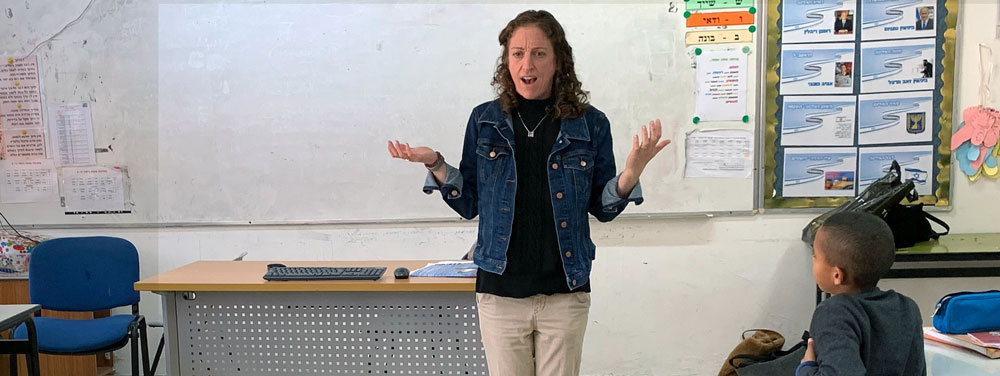
In this momentous year uplifting racial injustice and inequality, we felt it crucial that the work of training Jewish Educators needed to examine our commitment to ‘b’zelem elohim‘ in new and contemporary ways. In partnership with Facing History and Ourselves, we resolved to provide an ongoing seminar, as the rabbinic/cantorial school had done intensively in the winter seminar, for our new cohort in the MJED program. This multi session seminar invites us all to consider our role in provide ‘brave spaces’ and ‘spaces of equity and justice’ in our own educational settings. To understand that this is the work of Jewish Education as we commit to ‘tikun‘ repair through our work with our communities, families and students. —Rabbi Michael Shire, Academic Director, Hebrew College’s Master of Jewish Education Program
My relationship with Facing History and Ourselves is a 22-year one, like a long-time inspirational friend. It began in 1999 when I was trained with a cohort of synagogue youth directors at Hebrew College in the former Brookline building. Our esteemed professor was Jan Darsa, a pioneer of the program. Since then, Facing History has traveled with me across two states, as I taught about the Holocaust from the front of synagogue Sunday School classrooms; as I utilized it as a teacher in the Hebrew College Prozdor program; and as I implemented it as education director of my own synagogue school, mentoring new teachers to embrace the curriculum as I had done in the past. It was my go-to set of lesson plans, my recommendation to others, my resource for Holocaust Studies.
When I recently joined Hebrew College’s Master of Jewish Education Program, I was excited by the idea of gathering monthly to virtually learn together with others. When I discovered that Facing History staff would be joining us, I assumed I would be re-learning Holocaust teaching lessons I had learned in the past (and playing on my phone out of the Zoom frame).
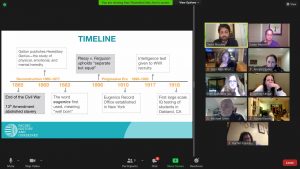
But, honestly, it was all new to me. After the first session with Facing History, I clicked on “leave meeting” and exhaled. Deeply. I closed my eyes and said to myself, “thank you. ” You see, this was not a session on Holocaust. The topic was Race ad Equity, a theme I have been struggling with personally and professionally since the front door of my house locked me in last March.
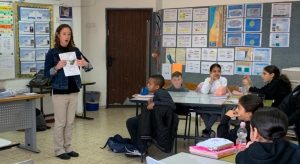 I am a Jewish educator. I am the Jewish educator who within the four walls of the classroom can “land” with my class at Ben Gurion Airport and be your tour guide, can teach you about Shavuot from the synagogue kitchen by mixing up together a batch of blintzes, and can teach you about the Holocaust by storytelling about my visits to Warsaw. That is firmly in my wheelhouse.
I am a Jewish educator. I am the Jewish educator who within the four walls of the classroom can “land” with my class at Ben Gurion Airport and be your tour guide, can teach you about Shavuot from the synagogue kitchen by mixing up together a batch of blintzes, and can teach you about the Holocaust by storytelling about my visits to Warsaw. That is firmly in my wheelhouse.
What is not in my wheelhouse is what extends outside my safe space of general Judaica and Hebrew.
And it has been a struggle for me to find the right gripping to steer this topic around my classroom. In 2019, the city where I live, Milwaukee, was ranked #1 as America’s most segregated city, with one of the widest gaps in prosperity. I work in a suburb with a privileged population that contributes to the segregation of the region. It would be an understatement to write that the topics addressed in the Facing History seminars were more than relevant.
Currently, I run a Teen Philanthropy Board with 46 members, focusing on social justice issues and Jewish values. The seminars with Facing History could not have been timed more perfectly.
On an airplane, you have to put on your oxygen mask before helping others do so. We begin with ourselves and our own health-physical and mental. Our Hebrew College cohort began together with Facing History to create a brave virtual space. I was given permission to find my own voice, to be introspective about my own mindset.
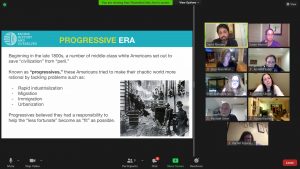
That proved to be a jumping-off point for my learning journey. With Facing History as the tour guide. I was seeking a final destination of awareness, of equity-based teaching practices, and of the skills and knowledge to be a tour guide for my own students.
In Pirkei Avot 1:6, we read Ben Zoma, “Who is wise? One who learns from everyone.” Facing History and Ourselves opened my eyes to a model of equity-based work. The training modules moved along a timeline from the past to the present to get me working towards my future of a more equitable framework for doing my own work as an educator. From a close examination of history, to inspirational words spoken by leaders from today and days behind us, to a look around our current landscape, I feel like I have finally found my footing to take steps forward with my class in a meaningful direction.
Gandhi said, “Be the change you wish to see in the world.” Facing History and Ourselves helped me evolve as an educator in my own mindset and practice to be the change agent I want to be in my classroom community and in our larger one.
As I travel on my journey as a Jewish educator, I look forward to continuing to grow with my reliable friend and mentor, Facing History and Ourselves.
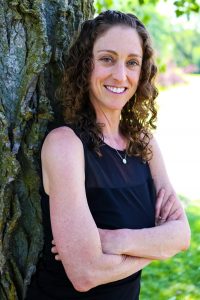 Jennifer Saber, a student in the Hebrew College Master of Jewish Education Program, has made Jewish education her motivation, passion, and vocation for the last 25+ years. She received her Bachelor’s Degree in Sociology and Jewish Studies, with a concentration in Middle Eastern Studies, from the University of Arizona, Tucson. She continued at Brandeis University in the Hornstein Program to receive a Master’s Degree in Jewish Communal Service, with a concentration in Jewish education. Currently her portfolio includes: Educational Development Consultant, North America for Shutaf Inclusion Programs in Jerusalem, as well as Teen Philanthropy Coordinator and Kesher Inclusion Specialist for The Milwaukee Jewish Federation. And for fun? You can find Jennifer in the kitchen trying out a new recipe, kickboxing at the gym, or getting a new stamp in her passport. Her heart is filled with Zionism, Inclusion, Advocacy, and wonder. But most of all she loves spending time hanging out in her hometown, Milwaukee, Wisconsin, with her husband Eric and three children.
Jennifer Saber, a student in the Hebrew College Master of Jewish Education Program, has made Jewish education her motivation, passion, and vocation for the last 25+ years. She received her Bachelor’s Degree in Sociology and Jewish Studies, with a concentration in Middle Eastern Studies, from the University of Arizona, Tucson. She continued at Brandeis University in the Hornstein Program to receive a Master’s Degree in Jewish Communal Service, with a concentration in Jewish education. Currently her portfolio includes: Educational Development Consultant, North America for Shutaf Inclusion Programs in Jerusalem, as well as Teen Philanthropy Coordinator and Kesher Inclusion Specialist for The Milwaukee Jewish Federation. And for fun? You can find Jennifer in the kitchen trying out a new recipe, kickboxing at the gym, or getting a new stamp in her passport. Her heart is filled with Zionism, Inclusion, Advocacy, and wonder. But most of all she loves spending time hanging out in her hometown, Milwaukee, Wisconsin, with her husband Eric and three children.

